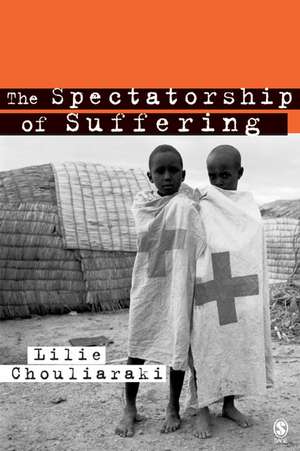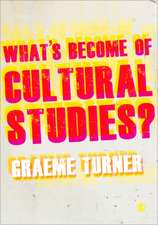The Spectatorship of Suffering
Autor Lilie Chouliarakien Limba Engleză Paperback – 6 iun 2006
`Lilie Chouliaraki grounds her sophisticated arguments in meticulous research. The result is a work of important scholarship that might even make us think about the world and its mediation in profoundly new ways' - Roger Silverstone, Professor of Media and Communications, The London School of Economics and Political Science
`Few intellectuals command this scope from classical rhetoric to the cutting edge of contemporary social theory as [Lillie Chouliaraki] is doing in her new book The Spectatorship of Suffering. This book is destined, in my mind, to be foundational for our understanding of not just the media but of the highly complex social process of mediation' - Ron Scollon, Professor of Linguistics, Georgetown University
This book is about the relationship between the spectators in countries of the west, and the distant sufferer on the television screen; the sufferer in Somalia, Nigeria, Bangladesh, India, Indonesia, but also from New York and Washington DC. How do we relate to television images of the distant sufferer? This question touches on the ethical role of the media in public life today. It addresses the issue of whether the media can cultivate a disposition of care for and engagement with the far away other; whether television can create a global public with a sense of social responsibililty towards the distant sufferer.
| Toate formatele și edițiile | Preț | Express |
|---|---|---|
| Paperback (1) | 400.94 lei 3-5 săpt. | +19.36 lei 7-13 zile |
| SAGE Publications – 6 iun 2006 | 400.94 lei 3-5 săpt. | +19.36 lei 7-13 zile |
| Hardback (1) | 1116.84 lei 6-8 săpt. | |
| SAGE Publications – 6 iun 2006 | 1116.84 lei 6-8 săpt. |
Preț: 400.94 lei
Nou
Puncte Express: 601
Preț estimativ în valută:
76.72€ • 83.60$ • 64.65£
76.72€ • 83.60$ • 64.65£
Carte disponibilă
Livrare economică 02-16 aprilie
Livrare express 19-25 martie pentru 29.35 lei
Preluare comenzi: 021 569.72.76
Specificații
ISBN-13: 9780761970408
ISBN-10: 0761970401
Pagini: 240
Ilustrații: 1, black & white illustrations
Dimensiuni: 156 x 234 x 12 mm
Greutate: 0.37 kg
Ediția:1
Editura: SAGE Publications
Colecția Sage Publications Ltd
Locul publicării:London, United Kingdom
ISBN-10: 0761970401
Pagini: 240
Ilustrații: 1, black & white illustrations
Dimensiuni: 156 x 234 x 12 mm
Greutate: 0.37 kg
Ediția:1
Editura: SAGE Publications
Colecția Sage Publications Ltd
Locul publicării:London, United Kingdom
Cuprins
Introduction
Distant Suffering on Television
Mediation and Public Life
The Paradoxes of Mediation
Mediation, Meaning and Power
The Analytics of Mediation
Adventure News
Suffering without Pity
Emergency News
Suffering without Pity
Ecstatic News
Suffering and Identification
Mediation and Action
The Cosmopolitan Public
Distant Suffering on Television
Mediation and Public Life
The Paradoxes of Mediation
Mediation, Meaning and Power
The Analytics of Mediation
Adventure News
Suffering without Pity
Emergency News
Suffering without Pity
Ecstatic News
Suffering and Identification
Mediation and Action
The Cosmopolitan Public
Notă biografică
Lilie Chouliaraki¿s research interests broadly include Social and Cultural Theory, Ethics and Political Philosophy as well as Corporate Communication, Communication Theory and Discourse Studies. Her research focuses on the nature of mediated public discourse from an ethical and political perspective. She has published extensively on the moral implications of the media in contemporary public life, particularly on the link between mediation, social action and cosmopolitan citizenship. Part of her research further addresses the intersection between politics, culture and corporate discourse. She has also researched the mediation of youth politics as well as the workings of pedagogic discourse and its implications on youth identities.
Descriere
This book is about the relationship between the spectators in countries of the west, and the distant sufferer on the television screen; the sufferer in Somalia, Nigeria, Bangladesh, India, Indonesia, but also from New York and Washington DC. How do we relate to television images of the distant sufferer? The question touches on the ethical role of the media in public life today. They address the issue of whether the media can cultivate a disposition of care for and engagement with the far away other; whether television can create a global public with a sense of social responsibililty towards the distant sufferer.













